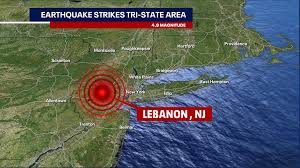|
Getting your Trinity Audio player ready...
|
NYC Under Fire for Delayed Emergency Alert Response to 4.8 Magnitude Quake
Edited by: Fern Sidman
In a scenario that exposed a critical gap in New York City’s emergency response system, officials faced sharp criticism on Friday following a 4.8 magnitude earthquake that jolted the Big Apple and surrounding regions, as was reported in The New York Post. Despite the seismic event striking near Lebanon, New Jersey, at approximately 10:23 a.m., it took nearly 25 minutes for an emergency alert to be issued to residents via the city’s Notify NYC system.
According to the US Geological Survey, the earthquake’s tremors reverberated swiftly across the tri-state area, prompting immediate concern among residents. However, the report in the Post indicated that the delayed response from New York City’s emergency management authorities left many questioning the efficiency and effectiveness of the city’s alert protocols.
The Notify NYC phone alert finally went out at 10:47 a.m., followed by a Wireless Emergency (WE) alert at 11:02 a.m. from the city, and a state-level WE alert at 11:05 a.m. As was noted in the Post report, despite these efforts, some residents reported receiving alerts about the earthquake well past noon, highlighting further inconsistencies in the dissemination of critical information.
Zachary Iscol, head of the city’s Office of Emergency Management, addressed the media during a press conference following the seismic event, defending the delay in issuing alerts. According to the information provided in the Post report, Iscol cited the need for confirmation of the earthquake’s occurrence and the formulation of accurate guidance before alerting residents, asserting that the 20-minute timeframe for public notification was considered remarkably swift given the circumstances.
The initial notification issued by the city urged residents to remain indoors and instructed them to dial 911 in case of injuries. Subsequent alerts acknowledged the possibility of aftershocks but reassured New Yorkers that they could proceed with their usual activities.
Responding to inquiries regarding the purpose of the alert, the state Office of Emergency Management clarified that the primary objective was to warn residents about potential aftershocks, emphasizing the importance of preparedness and vigilance in the aftermath of seismic activity, the Post report indicated.
The delayed response and subsequent explanations from city officials have sparked intense scrutiny and debate among residents and experts alike. As was detailed in the Post, critics argue that the prolonged delay in issuing alerts undermined public safety and eroded trust in the city’s emergency management infrastructure.
The incident underscores the pressing need for comprehensive review and enhancement of emergency alert systems to ensure timely and effective communication during crises. As seismic events and other natural disasters pose ongoing threats to urban centers like New York City, the imperative for robust emergency preparedness measures becomes increasingly apparent.
Vish Burra, an outspoken commentator on X, derided the Adams administration for what he described as a quintessential example of bureaucratic inefficiency. Similarly, the Post report said that another user on X characterized the delayed alert as emblematic of governmental ineptitude, highlighting the frustration felt by many New Yorkers.
Brooklynite Clarence Patton voiced his exasperation with biting sarcasm, mockingly addressing the “Miss Emergency Alert System” and highlighting the potentially dire consequences of such delays in the event of a more severe earthquake, according to the Post. Phil Calçado, recounting his personal experience, revealed that his mother in Brazil had even reached out to him before the emergency alert was dispatched, underscoring the absurdity of the situation.
Ben Max, the program director for the Center for New York City Law, found humor in the debacle, admitting that he couldn’t help but laugh at the belated timing of the emergency alert. The report in the Post also pointed out that one resident went so far as to draw a humorous analogy, likening the delayed message to unmuting oneself at the conclusion of a Zoom call merely to express gratitude.
The outpouring of frustration and ridicule underscores the broader sentiment of disillusionment and distrust towards governmental institutions and emergency response mechanisms. The delayed alert not only exposed flaws in the city’s emergency preparedness protocols but also served as a stark reminder of the potential consequences of administrative inefficiency during times of crisis.




